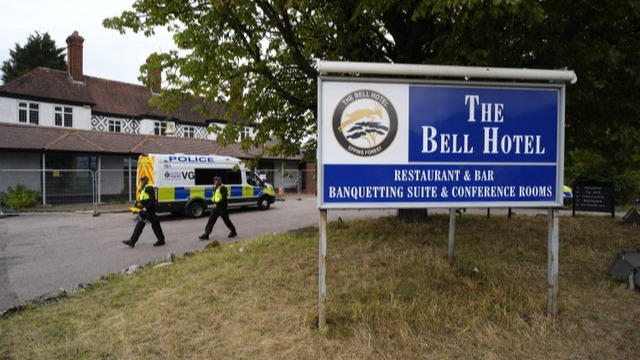After weeks of protests across the country, ITV News Political Correspondent Harry Horton reports on the Court of Appeal hearing over a decision to keep asylum seekers out of the now infamous Bell Hotel
A bid by the Home Office to appeal the decision to temporarily block asylum seekers from being housed at a hotel in Epping has begun at the Court of Appeal.
The High Court ruled last week that asylum seekers must be moved out of the Bell Hotel in Epping by September 12, after a challenge from the Conservative council.
But the government announced a few days later that they would be seeking to appeal the decision, because while they want all asylum hotels to shut, they want to do it in an “ordered and managed way”.
The Home Office are challenging the decision not to let them intervene in the case – if that is granted, they would then be able to launch a full appeal against the ruling.
Three senior judges will rule on whether to overturn the temporary injunction at 2pm on Friday.
Edward Brown KC, for the Home Office, told the Court of Appeal on Thursday that it was “wrong” for the judge not to allow the Home Office to intervene in the proceedings.
He argued that blocking the Home Office’s bid to challenge the ruling “substantially interferes” with the statutory duty of the Home Secretary “in relation to the accommodation of very large numbers of, potentially, destitute asylum seekers”.
The barrister did however admit that the Home Office’s eleventh-hour bid to intervene could’ve been made sooner.
“With the benefit of hindsight, when the application was served the previous week it could have been responded to,” he said.
Mr Brown also warned in his written submission that the ruling risks sparking further protests: “The granting of an interim injunction in the present case runs the risk of acting as an impetus for further protests, some of which may be disorderly, around other asylum accommodation.”
Somani Hotels, which owns the Bell Hotel, is also seeking to challenge the ruling at the hearing on Thursday.
Piers Riley-Smith, representing Somani Hotels, told the court the “extremely high-profile nature of the issue” created a “risk of a precedent being set as a number of other local authorities are reported to be considering similar injunctions to address the use of hotels for asylum seekers”.
The hotel has been at the centre of a series of protests in recent weeks after an asylum seeker who was staying there was charged with sexually assaulting a 14-year-old girl.
The High Court ruling threatens to throw the government’s efforts to tackle illegal immigration into disarray – as a string of other councils have said they are considering similar legal action against asylum hotels in their area.
Ministers have committed to closing all asylum hotels by the end of this parliament, and have repeatedly insisted hotels aren’t suitable accommodation for asylum seekers. But the government wants to close the hotels on it’s own terms.

ITV News understands at least 30 local authorities are considering their options in light of the Epping judgement, with many open to legal action.
Among those 30 councils are nine Labour-run local authorities, ramping up pressure on Sir Keir Starmer’s government.
Home Secretary Yvette Cooper said on Friday that the government was appealing the ruling so that “the closure of all hotels can be done in a properly managed way right across the country without creating problems for other areas and local councils”.
The government has not yet confirmed where the 140 men currently living in the Bell Hotel will go, or where they plan to house asylum seekers after they have closed the other hotels across the UK.
Epping Council’s case hinged on the argument that Somani Hotels “did not advise or notify the local planning authority” that the site would be used to house asylum seekers, and also the disorder from the protests and counter-protests outside the hotel.
Shortly before judgment was handed down on August 19, the Home Office asked to intervene in the case.
Edward Brown KC, for the department, said that the injunction would “substantially impact on the Home Secretary’s statutory duties” to asylum seekers and added that the move “causes particular acute difficulties at the present date”.
Mr Justice Eyre said that it was “not necessary” for the Home Office to be involved in the case, stating that it would cause the “loss of yet further court time”.
The latest Home Office data, published last week as part of the usual quarterly immigration statistics, shows there were 32,059 asylum seekers in UK hotels by the end of June.
This was up from 29,585 at the same point a year earlier, when the Conservatives were still in power, but down slightly on the 32,345 figure at the end of March.
The appeal bids come in the same week as a resident at the hotel, Hadush Gerberslasie Kebatu, has been on trial accused of sexually assaulting a 14-year-old girl last month.
Multiple demonstrations were held at the Bell Hotel after Kebatu was charged.
Another man who was living at the site, Syrian national Mohammed Sharwarq, has separately been charged with seven offences, while several other men have been charged over alleged disorder outside the hotel.
Follow STV News on WhatsApp
Scan the QR code on your mobile device for all the latest news from around the country




























